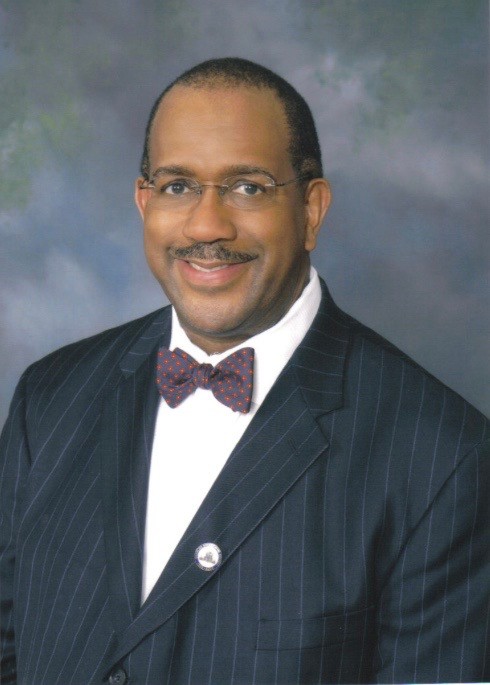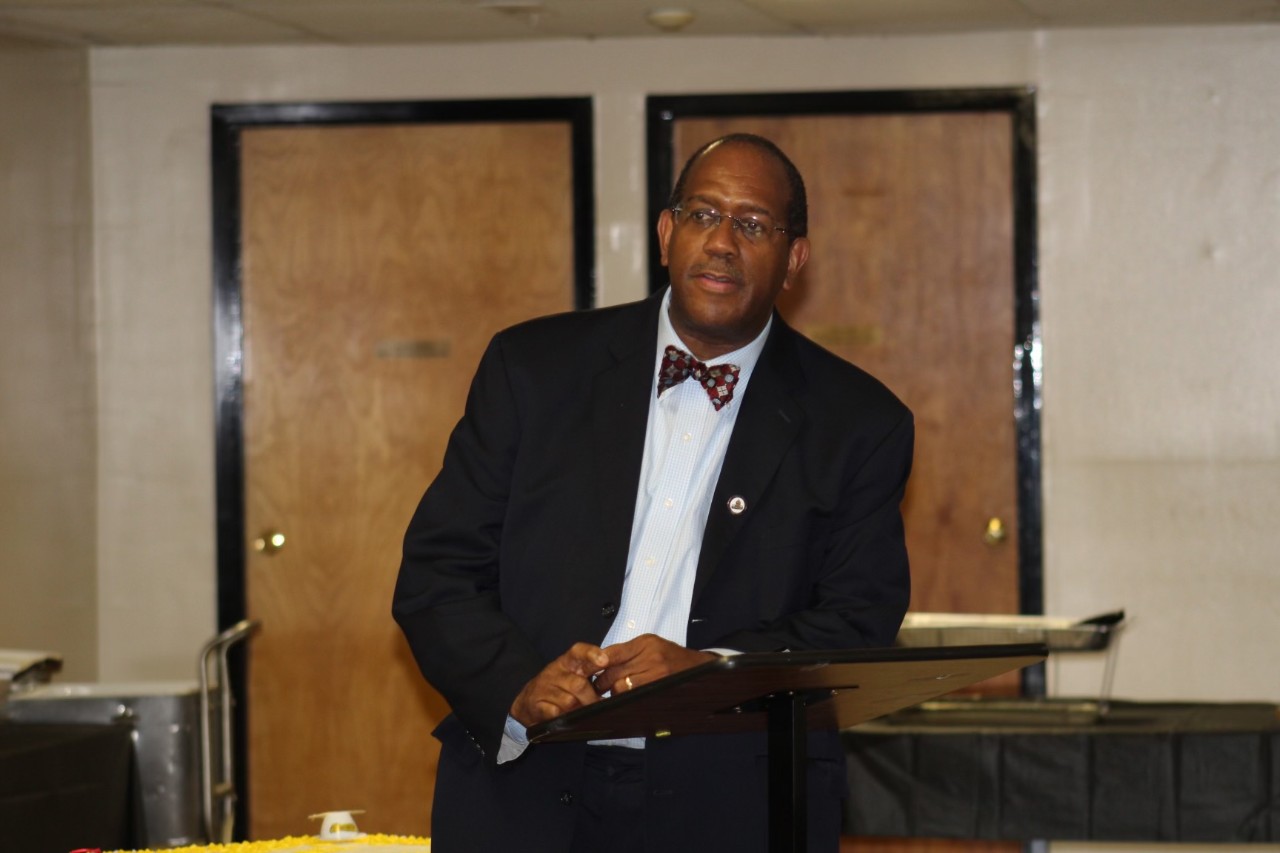
Rev. Gregory Groover, Sr. Courtesy photo.
Rev. Gregory Groover, Sr., the senior pastor of the Historic Charles Street African Methodist Episcopal Church in Roxbury, Massachusetts, will deliver the keynote address at the diploma ceremony for the Boston College School of Social Work on May 22.
The ceremony will take place at around noon on the Lower Campus Lawn, rain or shine.
Groover said his talk will focus on social workers’ “indispensable” role in addressing some of the world’s most pressing social problems. He pointed to racism, anti-Semitism, and homophobia as three examples of issues that social workers are well-equipped to help tackle.
“There is an indispensable role for the social worker to address those issues, issues that should not be left only to our elected officials or even our educators,” said Groover, whose academic background includes a master’s in social work from Columbia University and a doctorate in ministry from the New York Theological Seminary. “Social workers play an immensely extraordinary role in creating a world of hope.”
Groover acknowledged that his parishioners sometimes tell him “we’re seeing too much of a social worker in you and not enough of a pastor.” But he said social work and ministry are one and the same, pointing to the church’s food pantry, after school program, and gun violence prevention meetings as examples of how its commitment to the health and well-being of individuals, families, and communities aligns with the values of the helping profession.
“Our church is not just a Sunday morning venue, but is seven days a week trying to address the needs of not only our parishioners, but our neighborhood,” he said. “If we do not see ourselves as a servant in the neighborhood, we don’t have any right taking space in the neighborhood.”
Groover, who lives in Roxbury, has been serving the Greater Boston community as a pastor and community leader for nearly 30 years. Since becoming pastor at the Historic Charles Street AME Church in 1994, he has significantly increased the participation and diversity of his congregation, while establishing new ministries that have fortified congregational life and helped members cultivate their skills and talents. Under his leadership, close to 40 people have entered the ministry.
As a community leader, Groover has championed education, serving as a chair or board member of nonprofits, schools, and public panels that have aligned with a longstanding focus on helping children reach their full potential.
“Every child deserves the best education possible,” he said. “I really think that a good, solid quality education can be a pathway to a productive, fruitful, and meaningful future where one is making a difference and creating a positive social impact.”
His focus on education dates back to his childhood, when he viewed school as an escape from his impoverished youth. As a kid, he lived with his parents and seven siblings in a housing project on Long Island, yearning for the chance to leave his cramped apartment for a public school that piqued his love of learning.
“I ended up loving school even as an elementary student,” Groover recalled. “School was like my exit from staring at the monsters of poverty that not only visited us but lived in our midst in that crowded apartment.”
Aside from school, Groover spent most of his youth at his local church and community center. The community center, located in the basement of the housing project where he grew up, was run by Sara-Alyce Wright, a social worker who, Groover said, “became like a second mother to me” and was later named the first Black executive director of the YWCA USA in 1974.

Rev. Gregory Groover, Sr. Courtesy photo.
Watching Wright do her job—connecting families to resources, organizing activities for children—showed Groover how a social worker could bring hope to the most vulnerable and set him on a path toward an MSW.
“I was determined to get a graduate degree in social work, but I also knew that I had a calling into the ministry,” he said. “I was trying to figure out, and I’m still trying to figure out, how to marry the two.”
The answer may be found in his dedication to education. Groover currently serves as president of the Black Ministerial Alliance TenPoint, which works in partnership with over 100 nonprofits, churches, and ministries each year to improve services for low-income youth and their families in Greater Boston. As the former chair of the organization’s Education Committee, he helped convene public school officials, teachers, community leaders, parents, and the clergy to plan and develop a long-standing after school program called Victory Generation.
Groover also chairs the board of directors for the Hamilton-Garrett Center for Music & Arts, a program launched by his church to provide high quality instruction to Boston’s next generation of innovative artists. Named after two prominent members of his church, the Hamilton-Garrett Music and Arts Academy provides private lessons in piano, voice, guitar, percussion, and violin, alongside classes in music theory, history, Black identity, and more. According to the Academy’s website, 100 percent of students who have auditioned for the Boston Arts Academy have been accepted since HGMAA was founded over 20 years ago. Of those students, 44 percent have gone on to receive full tuition scholarships at Berklee College of Music.
In addition to these roles, Groover serves as a board member of The Massachusetts Society for the Prevention of Cruelty to Children and chairs the board of trustees for the Conservatory Lab Charter School in Dorchester, Massachusetts. He previously chaired the Boston School Committee; served as a board member for Gordon College, the YMCA of Greater Boston, and the Boston Foundation; and received the 2002 Henry L. Shattuck City Champion Award for outstanding public service.
Groover came to Boston from New York, where he served as pastor of the Bright Temple African Methodist Episcopal Church in the Hunts Point neighborhood of the South Bronx from 1987 to 1994. His ministry in Hunts Point, once one of the poorest neighborhoods in the United States, is featured in author Jonathan Kozol’s 1995 book Amazing Grace, which has been described as a “moving and critical narrative written in the spirit of the gospels, infused with love and steeped in the principles of justice.”
At Bright Temple, Groover created a number of ministries that addressed the educational, psychological, social, and spiritual needs of children living in Hunts Point. Among the ministries he founded was the “Building Great Minds Project,” an after school leadership-building program that was later adopted as a city-wide program administered by the Council of Churches of New York.
Groover said the idea for the program grew out of three simple questions: “How do we protect the children? How do we provide a safe, positive, nurturing environment for the children? How do we pour hope into the lives of the children?”
His message to his parishioners today—that everyone is capable of having a positive influence in their community—mirrors his own efforts to transform the lives of vulnerable youth two decades ago in South Point.
“One of the things that I’ve tried to teach at Charles Street is that we are responsible for one another. We can help others. We can reach others,” he said. “We have a mission to always be deeply devoted and caring about others, particularly those who we see who are suffering, who are without.”
He advised BCSSW’s graduating class of 2023 to pay attention to the news and use their knowledge of the world around them in tandem with the skills they’ve honed at the School to make the world a better place.
“Be fully attentive and conscious of the systemic ills and challenges around you,” he said. “You cannot become a social worker with tunnel vision, just focusing on what you do. Know that you have to look at the broader world around you and be committed to asking yourself every day, ‘What can I do to help make life better?’”
Several students and recent graduates will be involved in the diploma ceremony. Dorothy Brown, MSW’23, will deliver the invocation and Aishwarya Chitoor Subash, MSW’23, will give the student address. Musa A. Kamara, MSW’23, and Sarah Elizabeth Neville, PhD’22, will serve as the degree representatives. Seating for guests on the Lower Campus Lawn is first come, first served. People who are unable to attend the event can livestream the ceremony on the University’s Commencement page.


